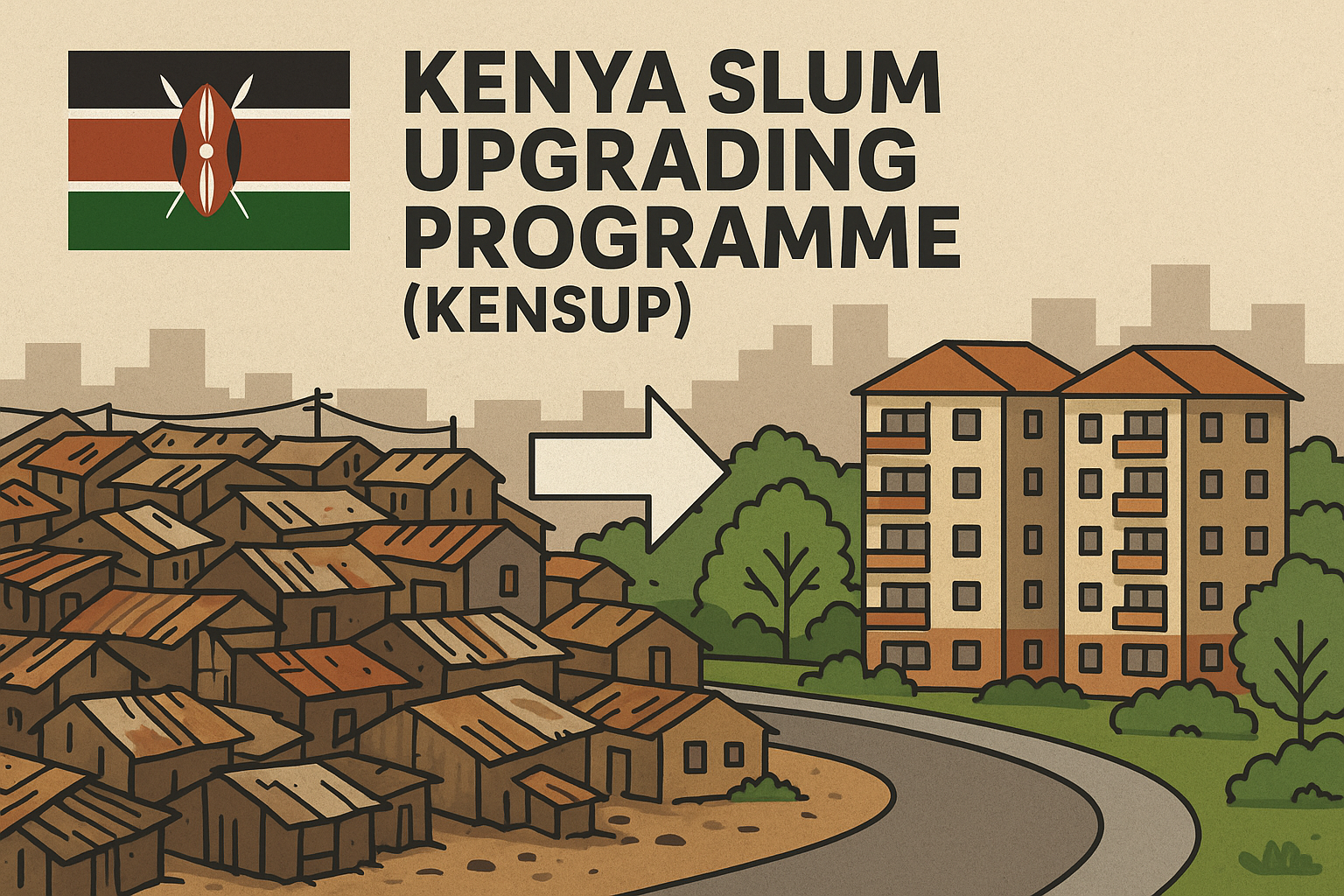Urbanization in Kenya has grown at an unprecedented rate, and with it, the proliferation of informal settlements or slums across major towns and cities. These settlements are often characterized by poor housing, inadequate sanitation, limited access to basic services, and tenure insecurity.
In response to these challenges, the Kenya Slum Upgrading Programme (KENSUP) was launched as a long-term initiative to improve the living conditions of slum dwellers across the country.
Background and Objectives
KENSUP was initiated in 2004 by the Government of Kenya in collaboration with UN-Habitat and other development partners. The program’s main aim is to improve the lives of residents in slum areas without necessarily displacing them. It aligns with Kenya’s broader housing and urban development goals, as well as international frameworks such as the UN Millennium Development Goals (MDGs) and later the Sustainable Development Goals (SDGs).
The core objectives of KENSUP include:
- Upgrading slum infrastructure (roads, drainage, sanitation, water, lighting)
- Providing affordable and decent housing
- Enhancing security of tenure
- Promoting community participation and ownership
- Improving access to basic social services
- Mainstreaming urban planning and policy reforms
Target Areas and Beneficiaries
KENSUP targets major urban centers where informal settlements are widespread, including:
- Nairobi (e.g., Kibera, Mathare, Mukuru)
- Kisumu
- Mombasa
- Mavoko (Machakos)
- Eldoret
The flagship project under KENSUP has been the Kibera Soweto East Pilot Project, which involved rehousing residents in high-rise apartments developed through public-private partnerships and donor support.
Key Components of the Programme
- Infrastructure Development
This involves the provision of paved access roads, stormwater drainage, sewer systems, clean water supply, electricity, and street lighting within informal settlements. - Housing Construction and Redevelopment
KENSUP constructs modern, affordable housing units to replace dilapidated structures. The new housing often includes social amenities such as schools, clinics, and marketplaces. - Community Participation and Capacity Building
Residents are involved through structures like Settlement Executive Committees (SECs) to ensure the project meets community needs and builds local ownership. - Tenure Regularization
The programme seeks to provide legal recognition of land tenure in slum areas, either through titling or long-term leases. - Livelihood and Social Support
KENSUP integrates income-generating activities, vocational training, and social services to support beneficiaries holistically.
Achievements
- Improved physical infrastructure in targeted settlements.
- Construction of thousands of new housing units (e.g., Lang’ata Decanting Site in Nairobi).
- Development of policies on slum upgrading and informal settlements.
- Strengthened partnerships between government, UN agencies, civil society, and local communities.
Challenges Faced
Despite its ambitious goals, KENSUP has faced a number of setbacks:
- Relocation Resistance: Some residents were reluctant to move into new housing due to fear of rent increases or loss of livelihood proximity.
- Resource Constraints: Limited funding and bureaucratic delays have slowed progress.
- Poor Coordination: Lack of coordination among stakeholders sometimes leads to project duplication or inefficiency.
- Affordability Issues: In some cases, the rent in upgraded housing remains unaffordable for original slum dwellers.
Way Forward
To maximize the impact of KENSUP and similar programs:
- Scale-up financing through public-private partnerships and donor investment.
- Improve policy coherence between slum upgrading, housing, and urban development frameworks.
- Promote inclusive design that considers the economic and cultural realities of slum residents.
- Monitor outcomes to assess long-term impact on poverty reduction, health, and quality of life.
The Kenya Slum Upgrading Programme represents a critical step toward inclusive urban development. While challenges persist, its comprehensive and participatory approach offers a model for improving the lives of millions of Kenyans living in informal settlements.
With stronger commitment, better planning, and adequate resources, slum upgrading can become a sustainable pathway to equitable urban growth.

